
Dominic Bezzina | |
|---|---|
| Born | |
| Occupation | Philosophy |
Dominic Bezzina (18th/19th centuries) was a minor Maltese philosopher who mainly specialised in physics. He also dealt with logic. [1]

Dominic Bezzina | |
|---|---|
| Born | |
| Occupation | Philosophy |
Dominic Bezzina (18th/19th centuries) was a minor Maltese philosopher who mainly specialised in physics. He also dealt with logic. [1]
It seems that Bezzina was born around the mid-18th century. After becoming a priest, he taught philosophy and science at the Cathedral School at Mdina, Malta. He was also a Canon at the Bishop's Cathedral Chapter. Bezzina taught at Mdina at least since 1819. One of the courses he delivered concerned physics.
Bezzina's only extant work is called Institutum Philosophicum (Philosophical Teaching). [2] It is still in manuscript form, [3] and contains 171 back to back folios. Unfortunately, the document is certainly incomplete. The extant manuscript is just the first part of a larger work. It is not known how many further part the whole work contained.
The extant part of the Institutum concerns logic. The division is typically that of Scholasticism, organised in books, chapters, and articles. Throughout the work Bezzina discusses the nature and conditions of Aristotelian logic, consciousness, and the genesis of ideas.
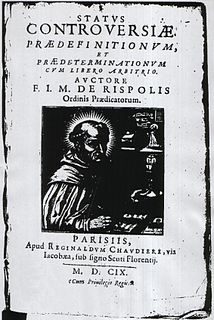
Philosophy in Malta refers to the philosophy of Maltese nationals or those of Maltese descent, whether living in Malta or abroad, whether writing in their native Maltese language or in a foreign language. Though Malta is not more than a tiny European island in the middle of the Mediterranean Sea, for the last six centuries its very small population happened to come in close contact with some of Europe's main political, academic and intellectual movements. Philosophy was among the interests fostered by its academics and intellectuals.
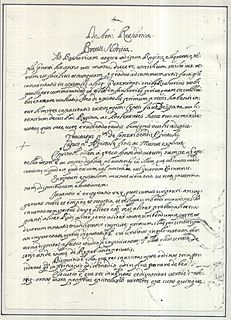
Dominic Borg was a minor Maltese philosopher who specialised in logic and rhetoric.
John Matthew Rispoli was a major Maltese philosopher of great erudition. He was held in high esteem by the Grand Masters of the Knights Hospitaller Order, the Bishops of Malta, the Viceroys of Sicily, cardinals, bishops, inquisitors, and the common people. Perhaps the most eminent Maltese philosopher of the Middle Ages, the various extant writings of his are witness to his philosophical aptitude and dexterity as to his high calibre as a philosopher. These qualities were highly appreciated during his lifetime, in Malta as in France and Italy. He lived a busy life, both as an intellectual and as an administrator. He was professor of philosopher at various institutions of high education, an able preacher, and an official at various posts within the Dominican Order, of which his was a member. He was an avid aficionado of music, and was talented with playing musical instruments. Though the fame of holiness accompanied him in his life, this did not deter the Inquisition from suspecting him of heresy, and keeping him in its dungeons for fourteen months. When he died, he was given an almost state funeral.

Thomas Cauchi was a minor Maltese philosopher who specialised in law.
Saverius Pace was a minor Maltese philosopher who specialised in physics.
Maximilian Balzan (1637–1711) was a minor Maltese mediaeval philosopher who specialised mainly in physics and art. He was also an accomplished theologian. He had a very successful administrative career, both in the civil as well as the ecclesiastical sphere, and he further gave a significant share in academic circles.

Henry Regnand was a minor Maltese philosopher who specialised mainly in logic and metaphysics.
George Sagnani was a minor Maltese philosopher who specialized mainly in ethics and morals.

Rosarius Mary Hagius (1673–1757) was a minor Maltese philosopher who specialised mainly in metaphysics.
Constance Vella (1687–1759) was a major Maltese philosopher who specialised mainly in physics, logic, cosmology, and metaphysics. Vella's speciality is that, despite being a Scholastic, he was not an Aristotelic-Thomist one, but rather an Aristotelic-Scotist philosopher, that is more in the line of John Duns Scotus.

Henry Ercole was a minor Maltese mediaeval philosopher who specialised mainly in ethics and logic. He enjoyed great esteem from his contemporaries, both as an administrator and a philosopher.
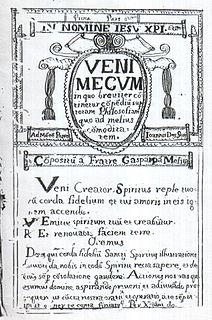
Gasper Grima (c.1680–1745) was a minor Maltese philosopher who specialised mainly in metaphysics and logic.

John Constance Parnis (1695–1735) was a major Maltese mediaeval philosopher who specialised mainly in metaphysics, physics, and logic.
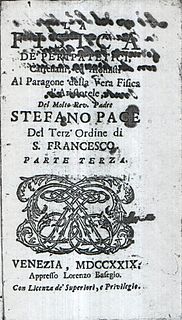
Stefano Pace (1695–1735) was a minor Maltese mediaeval philosopher who specialised mainly in physics.
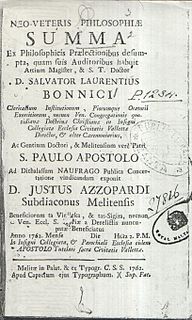
Justus Azzopardi was a minor Maltese philosopher. His area of specialisation in philosophy was chiefly metaphysics. No portrait of him is known to exist as yet.
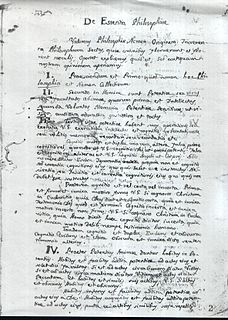
Joseph Rizzo was a minor Maltese philosopher and theologian who probably specialised in logic.
Jerome Inglott (1776–1835) was a Maltese philosopher and theologian. His areas of specialisation in philosophy were chiefly metaphysics and ontology. He held the Chair of Philosophy at the University of Malta (1822–27), and was one of the Philosopher-Rectors at the same university (1826–33).

George Caruana (1831–1872) was a Maltese minor philosopher mostly interested in epistemology. He held the Chair of Philosophy at the University of Malta (1859–72).
Francis Bonnici was a Maltese educationist, philanthropist and a minor philosopher. In philosophy he mostly specialised in pedagogy.
Joseph Sapiano (1911–1985) was a Maltese theologian and minor philosopher. In philosophy he was mostly interested in epistemology. He held the Chair of Philosophy at the University of Malta between 1953 and 1971.